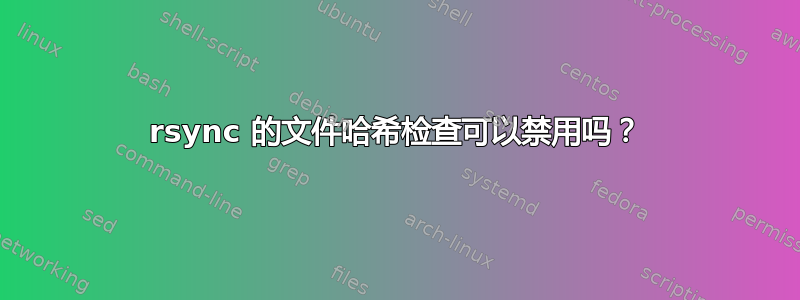
我正在从 Ubunutu 更新 OS X 系统,我更希望仅通过时间和文件大小检查文件差异,因为 OS X 的磁盘速度非常慢,我相信这可以加快这个过程。
我相信它还用于验证转账是否成功。我可以放弃这项检查。
答案1
默认情况下,rsync仅比较元数据(大小、权限、修改时间等)来检查已更改的文件。
要在检查文件更改时启用数据校验和,您必须明确传递该--checksum选项。
答案2
来自 rsync 手册页:
-c, --checksum
This changes the way rsync checks if the files have been changed and are in need of a
transfer. Without this option, rsync uses a “quick check” that (by default) checks if
each file’s size and time of last modification match between the sender and receiver.
This option changes this to compare a 128-bit checksum for each file that has a matching
size. Generating the checksums means that both sides will expend a lot of disk I/O read-
ing all the data in the files in the transfer (and this is prior to any reading that will
be done to transfer changed files), so this can slow things down significantly.
The sending side generates its checksums while it is doing the file-system scan that
builds the list of the available files. The receiver generates its checksums when it is
scanning for changed files, and will checksum any file that has the same size as the cor-
responding sender’s file: files with either a changed size or a changed checksum are
selected for transfer.
Note that rsync always verifies that each transferred file was correctly reconstructed on
the receiving side by checking a whole-file checksum that is generated as the file is
transferred, but that automatic after-the-transfer verification has nothing to do with
this option’s before-the-transfer “Does this file need to be updated?” check.
For protocol 30 and beyond (first supported in 3.0.0), the checksum used is MD5. For
older protocols, the checksum used is MD4.
因此,看起来只要您不指定 -c,它就不会在传输前进行文件校验。但它在传输后仍会进行校验。我在手册页中没有看到任何内容表明可以禁用检查后的校验。
答案3
尝试rsync选项--no-checksum


